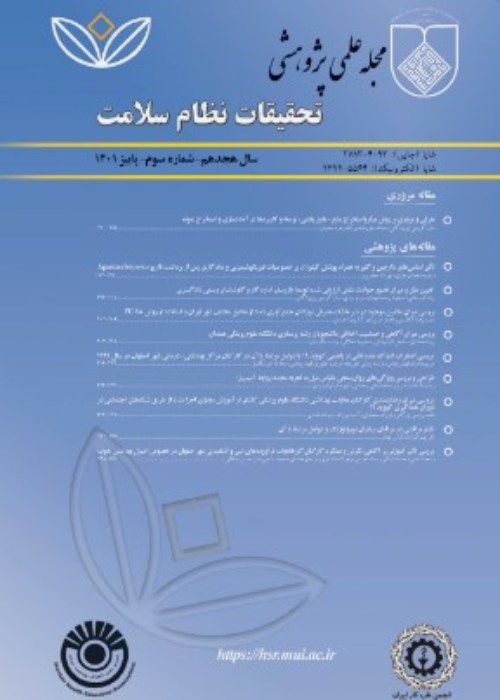ExercisingSelf-Efficacy in Patient with Heart Failure: AReview Study
Author(s):
Abstract:
Background
Physical symptoms are often associated with poor quality of life (QOL) in patients with heart failure (HF). Progressive impairment in the ability ofperforming routine physical activities of daily lifeand decrease inexercise tolerance is thought to lead to the worsening of physical symptoms. Exercise and physical activity can improve functional capacity، and improve the symptoms associated with HF. For these reasons، exercis is recommended as an adjunct to the medication therapy in patients with HF. Additionally، studies that have applied the efficacy-based interventions to improve exercise participation have beendiscussed. The aimof this review wasto summarize the literature on role of self-efficacy as a leading construct of social cognitive theory (SCT) in physical activity of patients with heart failure. Methods
We searched five relevant electronic databases using the terms based on the diagnosis of self-efficacy، chronic heart failure، heart failure،congestive heart failure،rehabilitation، physical activity andexerciseduringAugust1992 to 2012. We also used the gray literature and review to ensure that all the relevant papers were included in the review. Out of 34 collected papers،less than half (n = 12) were found relevant tothis review. Findings
Thisstudyhas identified self-efficacyas the most prominent factoraffecting on exercise and regular physical activityin heart failure patients. Beyond the role of self-efficacy as a predictor، exercise adherence in CHF patients is of high importance. It has also identified dominant strategies through which patients with CHF improve their self-efficacy exercise and following adherence such as performance accomplishments، vicarious experience، verbal persuasion and emotional arousal. Conclusion
A number of studies have recognized that exercise self-efficacy wasstrongly associated with the amount of physical activity undertaken in heart failure patients. Evidence from some trials supportedthe view that incorporating the theory of self-efficacy into the design of an exercise intervention is beneficial. Moreover، exercise interventions aimed toimprovethe self-perception of exercise self-efficacy which can have positive effects on confidence and the ability to initiate and recover heart failure symptoms. Finally، it is important to test these self-efficacy interventions more widely، especially to leadpatients to the behavioral modifications.Keywords:
Language:
Persian
Published:
Journal of Health System Research, Volume:8 Issue: 6, 2013
Pages:
929 to 941
magiran.com/p1125362
دانلود و مطالعه متن این مقاله با یکی از روشهای زیر امکان پذیر است:
اشتراک شخصی
با عضویت و پرداخت آنلاین حق اشتراک یکساله به مبلغ 1,390,000ريال میتوانید 70 عنوان مطلب دانلود کنید!
اشتراک سازمانی
به کتابخانه دانشگاه یا محل کار خود پیشنهاد کنید تا اشتراک سازمانی این پایگاه را برای دسترسی نامحدود همه کاربران به متن مطالب تهیه نمایند!
توجه!
- حق عضویت دریافتی صرف حمایت از نشریات عضو و نگهداری، تکمیل و توسعه مگیران میشود.
- پرداخت حق اشتراک و دانلود مقالات اجازه بازنشر آن در سایر رسانههای چاپی و دیجیتال را به کاربر نمیدهد.
In order to view content subscription is required
Personal subscription
Subscribe magiran.com for 70 € euros via PayPal and download 70 articles during a year.
Organization subscription
Please contact us to subscribe your university or library for unlimited access!



